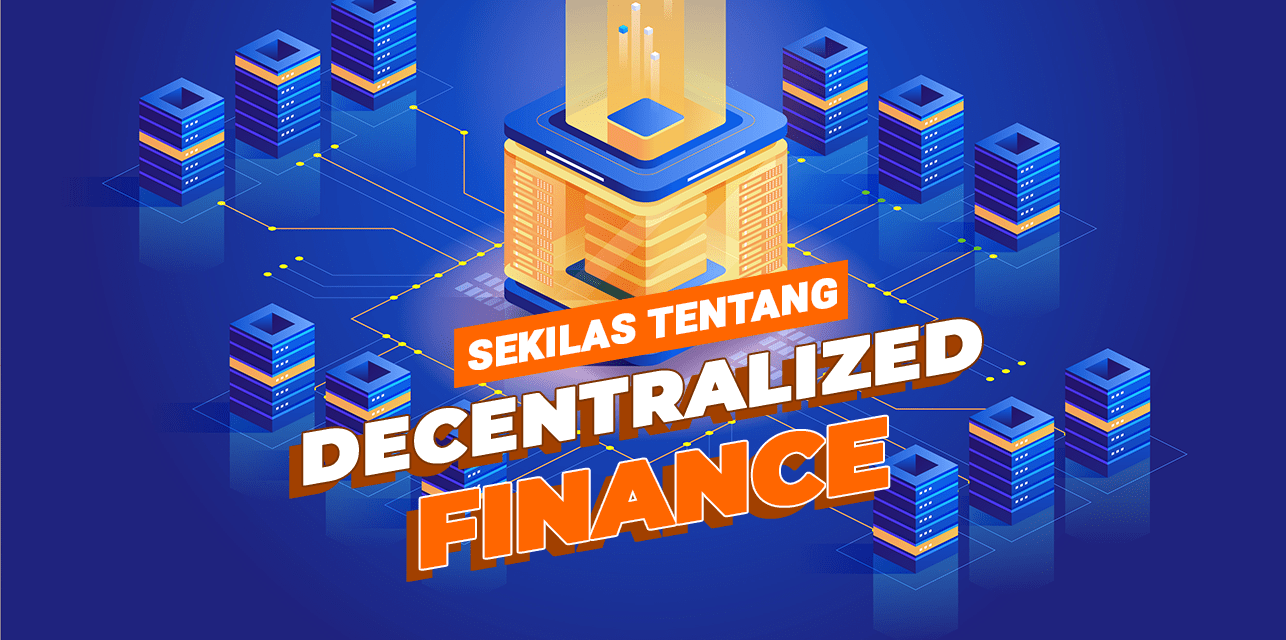What is Decentralized Finance (DeFi)?
DeFi is a collective term for financial products and services that can be accessed by anyone who can use Ethereum – anyone with an internet connection. With DeFi, the market is always open and there is no centralized authority that can block payments or deny you access anything. Services that were previously slow and risky, whereas with DeFi human error is automated and safer now because it is handled by code that can be checked and researched by anyone.
There is a booming crypto economy out there, where you can lend, borrow, go long/short, earn interest, and more. Crypto-savvy Argentines have been using DeFi to avoid crippling inflation. Companies have started streaming their employees' salaries in real time. Some people have even taken out and paid off loans worth millions of dollars without the need for personal identification.
How Does DeFi Work?
DeFi blockchains ensure that their processes are secured by using "keys." In this technology, when you are going to use a set of encrypted keys, you will get a unique identification that no one can access. Typically, this key pair includes both public and private keys. In reality, the process of using key pairs to encrypt this information is called "asymmetric cryptography," and it's very popular in the blockchain space.Although, some decentralized finance apps work differently where you can perform actions with KYC protocols. Since there are cryptocurrencies involved, then your public key will most likely serve as your digital wallet. So, using your private key, you can buy, sell, or even send cryptocurrency. This is why you really have to keep it safe. So, to send a transaction, you must authorize it with your private key.
Once you do that, the system will create a block that represents the transaction and notify the system for others to verify. After that, when someone else verifies that it is a valid request, then your transaction request will be executed and the block will be added to the ledger. Furthermore, all blocks get a unique id and a time frame that prevents any kind of malicious activity. In DeFi, you will get a pseudo-anonymous address. So, basically, no one can see your name, but they can see your address, which will contain random numbers and letters. Before continuing with the discussion of DeFi in crypto, you can take the time to fill out an internal survey to participate in building a more innovative GIC.
How is DeFi on Cryptocurrency?
Examples of Decentralized Finance
Here are examples of decentralized finance in Economics and Crypto. Here's an example of DeFi in economics and crypto.Examples in Economics
Examples of how decentralized finance applications can transform traditional processes and the parties involved include: Lending, borrowing, and saving: instead of banks using savings to invest and lend, smart contracts manage deposits, pay interest, and lend based on pre-defined terms outlined by the marketExamples on Crypto
- Exchanging digital assets, for example converting Bitcoin for other digital assets on the open internet market, takes all the typical processes of banks and payment service providers, translates them into contract language and automates them
- Derivatives, which usually involve contracts with organizations or individuals and clearing houses or intermediaries to be completed, can be managed with smart contracts on the open market
- Tokenization of physical assets or financial assets in the supply chain or financial transactions and enabling more accurate, efficient, and transparent markets
What is the Difference Between Centralized and Decentralized Finance?
Centralized finance is a type of financial practice within the scope of cryptocurrencies where users can earn interest and get loans on their digital assets such as Bitcoin, Ethereum, USD Coins such as USDT & USDC, and so on, through a centralized platform. Platforms can be managed by a person, a group of people, and usually within the jurisdiction of a financial technology (fintech) company.Meanwhile, decentralized finance is a financial service that uses a series of smart contracts and algorithms to run its services. A contract is an automatic agreement that does not require an intermediary or bank. They run on the Ethereum network and use blockchain technology. DeFi platforms like Compound Finance are non-custodial, which means users deposit their funds to be managed by smart contracts. No company or individual has access to the fund. Then, what about the risks of this DeFi financial service? Before proceeding to the risk, invite your friends to be able to join trading with GIC or become an IB by getting benefits in the form of additional income from GIC.
What are the Risks of Investing in the DeFi System?
DeFi offers new and exciting financial freedom, but this comes with risks. These risks include :- DeFi technology is immature and has not been fully stress-tested on a large scale over a long period. Funds may be lost or at risk. DeFi platform compounds, for example, have experienced serious problems recently where customers have accidentally sent millions of dollars in crypto.
- Lack of consumer protection. DeFi has come a long way in the absence of rules and regulations. But this means users often have little or no protection when things go wrong. There are no state-run reimbursement schemes that cover DeFi and no legislation enforcing capital reserves for DeFi service providers.
- Hackers are a threat. While hacking is also a risk in traditional finance, the expanded DeFi technology architecture, with multiple potential points of failure, increases the so-called attack surface available to sophisticated hackers. For example, a "white hat" hacker exploited a smart contract vulnerability in August 2021, stealing $610 million from DeFi platform PolyNetwork. Fortunately, all funds were returned.
- High collateral requirements. Almost all DeFi loan transactions require a guarantee of at least 100 percent of the loan value, if not more. This requirement severely limits eligibility for many types of DeFi loans.
- Private key requirements. With DeFi and cryptocurrencies, users must secure the wallet used to store cryptocurrency assets. This is an important requirement for individual private investors and institutional investors who use multi-signature wallets. A private key, which is a long, unique code known only to the wallet owner, is used to do this. If a private investor loses their keys, for example, they lose access to their funds forever.
What are the Disadvantages and Advantages of DeFi?
Here we will discuss the advantages and disadvantages of this DeFi financial service, see more!Advantages of DeFi
The promising aspects related to DeFi discussions show effective observation of the advantages and disadvantages of DeFi. The DeFi movement aims to introduce a wide range of benefits for customers and investors. Some of the notable advantages of DeFi will include the elimination of intermediaries in addition to centralized control. In addition, it will aim to increase the accessibility of financial markets to institutional investors. At the same time, DeFi will also seek to create new investment opportunities that can take the concept to a new level. To achieve benefits, DeFi solutions rely heavily on the fundamental nature associated with blockchain technology.1. Without permission
2. Eternity
The effective utilization of cryptography along with consensus algorithms such as proof-of-work has helped blockchains in achieving true immutability. Thus, the advantages and disadvantages of decentralized finance have enabled the real benefits of permanence in the financial field. With the help of immutability, it is practically impossible to manipulate any records on the blockchain network. In addition to its decentralization features, immutability offers promising security guarantees. Interestingly, blockchain functionality for immutability ensures the integrity of DeFi solutions in conducting financial transactions.3. Transparency
While immutability is an essential requirement for the DeFi landscape to provide security assurance, transparency is also one of the important additions among DeFi professionals. Decentralization clearly requires better transparency, and a distributed ledger displays information about all activities on the blockchain network. Cryptographic principles for blockchain also ensure the documentation of information only after verification of authenticity.The advantages and disadvantages of DeFi show how customers can benefit from the transparency of DeFi applications. For example, transparency in DeFi applications can increase due diligence. At the same time, DeFi applications can also support people in identifying and avoiding possible financial fraud as well as negative business practices. With the right audit trail, DeFi applications can make it easier to identify who made changes to a transaction, at what point in time, and in what way. As a result, there is little left to compromise the integrity of the financial ecosystem.
4. Borrow Borrow Application
5. Savings App
6. Tokenization
Any discussion of the advantages and disadvantages of DeFi without mentioning the advantages of tokenization is incomplete. Tokenization is one of the important topics that have emerged recently in the blockchain field. Ethereum enables strong smart contract capabilities, thus paving the way for issuing crypto tokens. Crypto tokens basically function as digital assets that exist on the blockchain in addition to having different features and uses.Some well-known examples of tokens include native utility tokens for specific dApps, real estate tokens, or security tokens. Tokens are capable of helping you achieve different functions. Real estate tokens can help you achieve fractional ownership of physical property. On the other hand, security tokens can also function effectively as digital shares within certain applications. Most importantly, tokenization can also ensure better exposure to other assets, both physical and digital. Assets can include digital currencies, fiat currencies, oil, or gold. Crypto-synthetic assets have collateral in the form of tokens in Ethereum-based smart contracts. Interestingly, one of the largest synthetic asset platforms, Synthetix, currently has around $600 million locked in smart contracts.
Disadvantages of DeFi
Many of the leading discussions surrounding decentralized finance in today's day have mostly focused on the advantages of DeFi. However, it is important to get a neutral impression of the pros and cons of DeFi in order to effectively estimate its potential. In fact, most of the problems and risks associated with DeFi projects are primarily related to the technology associated with them. Challenges with blockchain are generally responsible for triggering the cons of DeFi. Here are some of the critical setbacks you can encounter with DeFi adoption.1. Scalability
DeFi projects are undoubtedly well-suited to enable financial inclusion for a wider population. However, DeFi projects face major difficulties in the scalability of blockchain hosts from various perspectives. First of all, DeFi transactions require a very long period of time to confirm. At the same time, transactions on DeFi protocols can become very expensive during periods of congestion. For example, Ethereum can demonstrate the ability to process nearly 13 transactions every second with Ethereum at full capacity. In contrast, a centralized partner for DeFi can accommodate thousands of transactions in the period in question.2. Uncertainty
Concerns about uncertainty also mark the advantages and disadvantages of decentralized finance. In the event of instability in the blockchain hosting the DeFi project, the project can automatically inherit the instability from the host blockchain. As of now, the Ethereum blockchain is undergoing various changes. For example, mistakes made during the transition from the PoW consensus to the new PoS Eth 2.0 system can pose a risk.3. Liquidity Concerns
Liquidity is also undoubtedly an important factor in DeFi-based projects and blockchain protocols. As of October 2020, the total value locked in DeFi projects amounted to more than $12.5 billion. Therefore, it is clear that the DeFi market is not as large as the traditional financial system. So, it can be difficult to put your trust in a sector that is not as much as the financial sector is usually.4. Shared Responsibility
Among all the advantages and disadvantages of DeFi, the shared responsibility factor works negatively for users. DeFi projects are not responsible for any of your mistakes. All they do is eliminate the middleman, and it is the user who must be responsible for their funds and assets. Therefore, the DeFi space needs tools that can prevent possible errors and human error. After knowing about the shortcomings, it's a good idea to take a preliminary test with the aim of testing your trading skills so far.Related Topic
What Is Centralized Finance?
Before the concept of decentralization emerged, CeFi was one of the revolutionary technologies that combined some of the advantages of DeFi results with the convenience and security of standard financial services products. To understand centralized finance, we need to understand what centralization is.How Centralized Finance Works
The process of centralization refers to the centralization of the planning and decision-making process within an organization to a single leader or location. In a centralized organization, the head office retains decision-making authority, while all subordinate offices receive orders from the main office. The headquarters houses executives and specialists who make important decisions. All crypto trading orders are routed through a central exchange in centralized finance (CeFi). The money is managed by the individuals responsible for these exchanges. This implies that a person does not have access to their wallet because they do not have the private key.Next, the exchange chooses which currencies are available for trading and how much the user must pay for trading on their platform. After knowing about DeFi, then you already know the various advantages and risks that will be covered. Make sure to consider all the risks that exist if you want to use this financial service. In addition, don't forget to fill out a trader assessment so that you can consult with expert traders at GIC.
 Last:
Last: 







